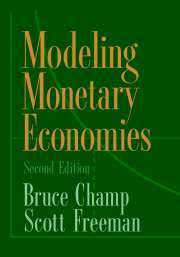Part II - Banking
Summary
UNTIL NOW we have confined our attention to model economies where fiat or commodity money was the only asset. Although this was useful while we learned some basic features of monetary economies, it is hardly realistic. Therefore let us now study the demand for money in the presence of another asset. The introduction of alternative assets will also provide a framework in which to study banking (the intermediation of other assets into money) and central banking (the management of the monetary system). We also introduce some basic concepts that will be useful in later chapters: a diminishing marginal product of capital, rate of return equality, and risk aversion.
Chapter 6 begins with a model of capital, an alternative asset to money. Among assets, capital has particular importance because its level affects output. We discover conditions under which individuals are willing to hold money and capital (or other assets) simultaneously. In the appendices to Chapter 6, we supplement our discussion of alternative assets to fiat money. Appendix A presents a model of a credit economy, in which private loans are used to finance consumption. Appendix B discusses the determination of the socially optimal level of capital in an economy.
A central question in the study of monetary economics is why people hold fiat money when there are alternative assets that pay higher rates of return. Chapter 7 investigates one possible answer to that question by noting that money is more liquid than other assets. In the course of the investigation, we also discover important relationships between real and nominal interest rates and inflation rates.
- Type
- Chapter
- Information
- Modeling Monetary Economies , pp. 115 - 116Publisher: Cambridge University PressPrint publication year: 2001



